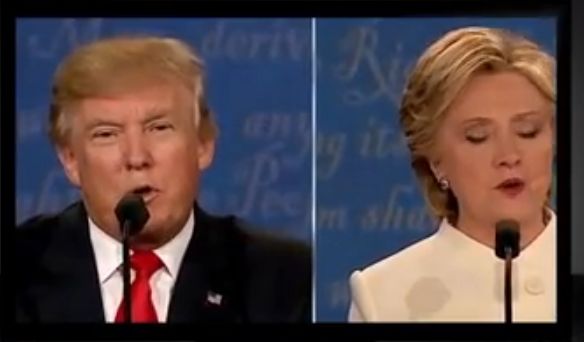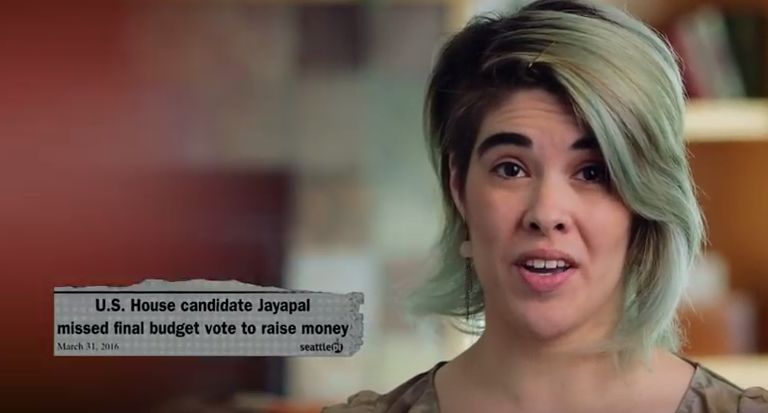With Trump Comparison, Jayapal Ad Has Turned My Face into a Weapon Against My Own Family

When I volunteered to be in an ad for U.S. congressional candidate Brady Walkinshaw, I never imagined I’d be compared to Donald Trump.
But that was before his opponent Pramila Jayapal's campaign ran a counter ad in which I play an unwilling role. The ad shows Donald Trump to imply that Walkinshaw's ad is smiliar to Trump's sexist attacks against Hillary Clinton, and then segues to a shot from Walkinshaw’s ad that shows Walkinshaw and my face too. To understand the damage, you need to know some things about me.
As the possibility of a President Trump became real to me, I started to worry about my Mexican-American family. I’m pale, and am not consistently read as Latina, but that’s not the case for them. I couldn’t sleep from worry. I was depressed for weeks.
I’m also a poet who sometimes hosts and performs at a regular slam on Capitol Hill. While my work is rarely explicitly political, this year I felt I had to perform a piece urging my community to stand up for my family and vote against Trump. In other words, I don't just low-key dislike Donald Trump, I've publicly tried to get people to vote against him.
I’m sure you can imagine how hurt I was to see Jayapal’s ad. A fellow woman of color used my face to imply that by supporting my candidate, I was in alignment with Donald Trump—that my progressive advocacy was somehow synonymous with his hateful rhetoric. As I often do during stressful times, I called my mother, whose hurt mirrored my own. She reminded me of our immigrant matriarchs, wonderful women who made us who we are, and affirmed my feeling that Jayapal’s disregard for our Latino identity made this ad an exceptionally low and painful blow.
Brady and I have had very different upbringings and experiences as Latinos, but this is one we share. Jayapal hoped to show Walkinshaw undermining women’s accomplishments, but in order to do it, she compared a progressive gay Latino to Donald Trump, a xenophobic demagogue. The carelessness of her false equivalence also implicated me, an ordinary supporter. And by the way—she didn’t get my consent to do that. If her campaign had asked, I wouldn’t have given it.
Jayapal’s ad makes it clear that to (allegedly) defend women, she’s perfectly happy to undermine years of work on ethnic solidarity. That’s dangerous. When you decide that you get to pick and choose who your justice applies to, it's no longer justice. All people of color—whether they agree with you, or whether they use their middle names often enough for you—deserve to be respected as such.
It also pays to remember that in an intersectional world, there’s no such thing as clean outrage. We all have countless ways of doing damage to each other, and one of the ways to mitigate that potential harm is to be cautious about how we strike out when hurt. I’m deeply disappointed in Jayapal for forgetting that.

I’ve come out of this experience with real concerns that if Jayapal is elected, she won’t be my representative. I hope that’s not true. I also hope that she’ll see this piece and consider pulling the ads that place me and Walkinshaw in such a painful, unjust position. I’m not running for office, and I don’t have name recognition: All I have is this sick feeling that I’m being used as a weapon against the people I love.
Elisa Catrina Chavez is a writer, spoken word poet, and copywriter in Seattle. Her work has appeared on Button Poetry.




